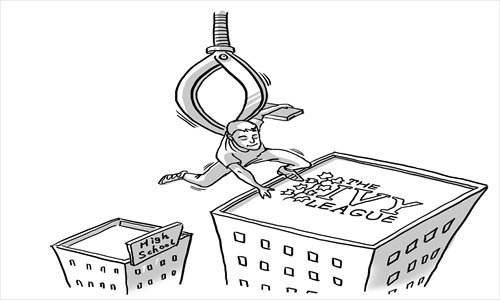US colleges offer easy path for wealthy

By now, most students graduating from high school this year have sent out their applications for colleges and are waiting for replies.
Among them is a friend's daughter who hopes to get into an Ivy League university. She has good SAT scores, excellent GPA numbers, and plenty of community service experience.
Nevertheless, she doesn't think she has a chance.
Last year, a couple of dozen students from her school, a well-performing one in an affluent town in Massachusetts, applied to Ivy League colleges. Only two got admitted.
One was an athlete. The other, an average student compared to her competitors from the same school, succeeded for having a grandfather who retired as the dean of the college she applied to.
"Dad, why aren't you a professor at Harvard?" my friend's daughter joked bitterly to her father.
This scene may sound as if it better fits China where connections, or guanxi, play a major role in the ethos of the society and parents' ties can make huge differences in their children's lives.
In the US, nepotism enjoys little tolerance from the public, let alone open admiration.
Government officials who offer lucrative jobs to family members are often put under close public scrutiny and sometimes even imprisoned.
Job applicants for major orchestras often have to do a test rehearsal behind a drop curtain to stop any possible favoritism from recruiters who may know them.
But college admission is an exception. Under "legacy admissions," colleges often give special consideration to applications from the children of their donors, faculties and alumni.
Prospective applicants are encouraged to check the box on the application form or highlight their existing ties to the school in their application essays.
And those who lack those connections are left with a very sour feeling.
There are other admission policies that offer benefits to certain applicants.
The athlete programs, for example, favor students who can help polish the school's reputation in sports competitions which are pursued with religious zeal in many schools.
In addition, many schools give extra points to minority students based on affirmative action, a law that guards and sometimes goes beyond equal opportunities.
Still, these policies focus on who the applicants are rather than who their parents are.
But according to research collected in a 2010 book Affirmative Action for the Rich, by the Century Foundation, legacies have been given more weight by colleges during the past two decades.
For example, in 2009, 41.7 percent of students who applied to Princeton through the legacy program were admitted, 4.5 times the rate of other applicants. That was up from 2.8 times in 1992.
And the demographic characteristics of the country determine that white and wealthy parents have more "legacies" than their minority and poor peers.
This makes China's notorious college admissions process seem fair and benign by comparison.
Colleges in China have long solely relied on the scores in college entrance exams to decide on admissions.
Indeed, at this time, many graduating high-schoolers in China are having the most intensive time of their young lives by burning the midnight oil to prepare for the exams in June.
This is, of course, neither a scientific nor a humane way to determine the qualification for colleges. But the silver lining of the rigid process is its simplicity.
The scores needed to get into the schools will be made public after the exams, and the students' scores are all published.
Above a certain level you are in, otherwise you are out.
Unfairness does exist, such as the lower scores required by students taking the exams in municipalities like Beijing and Shanghai, and the hukou (household registration) restrictions that force mobile workers' children to go back to their hometowns to take the exams.
But generally speaking, this may still be one of the few arenas, if not the last one, in China where guanxi and corruption have little space to maneuver.
And that may be why many youngsters from families struggling at the bottom of the social ladder still choose to believe that they can change their fate one day just by studying hard.
In recent years, the calls for reform of the college admission system have been picking up steam in China.
Reform may very well be necessary. But wherever it goes, let's not shatter the aspiring young's faith in the fairness of the system.
The author is a New York-based journalist. rong_xiaoqing@hotmail.com